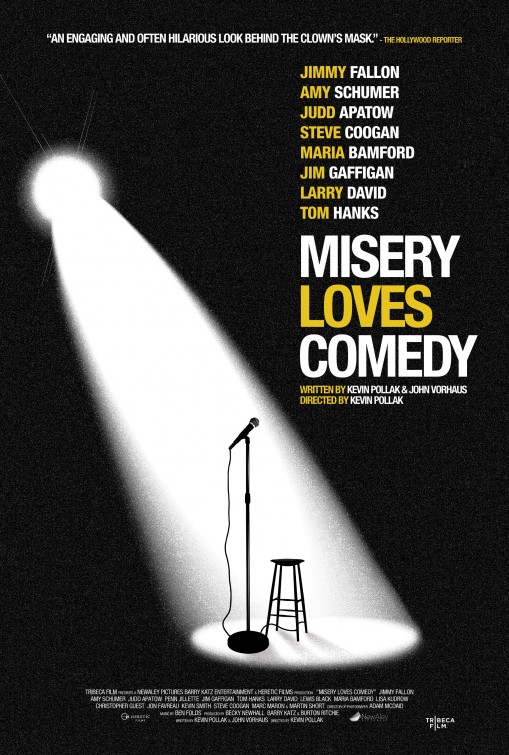Misery Loves Comedy

It is no secret that the business of comedy is a very serious one. In Kevin Pollack’s new Kickstarter-funded documentary Misery Loves Comedy, this is explored at length in a series of interviews with the director’s prestigious circle of contacts, which includes Whoopi Goldberg, Tom Hanks, Amy Schumer and Judd Apatow. Together, they contemplate the many ups and downs of being a comedian. Some tell hilarious stories about their time as stand-ups or theatre drudges, while others are uncharacteristically serious as they reveal the more complex reasons behind their need for laughter and applause. Over 50 interviews are combined in a fleeting 96 minutes, resulting in a comprehensive (if ultimately un-revolutionary) film, which, despite having many comics, contains few laughs.
Pollack’s concept, while engaging, is hardly original. The issues raised have been explored in numerous other fiction films, documentaries and books over the years, and the many anecdotes which make up the film shed little new light on the subject. This absence of ingenuity in the conversation also does nothing to help a cast of interviewees with a disappointing lack of diversity (only seven women and two people of colour are featured).
Darker themes of death, depression and suicide run through many of the anecdotes, from Freddie Prinze Jr opening up for the first time about his troubled father’s suicide, to a sombre epitaph to Robin Williams before the film’s closing credits. The memory of the late comic is strong throughout Misery Loves Comedy, in fact, as some of television and cinema’s funniest people attempt to explain the innate unhappiness which seems almost to be an occupational hazard. The film is strongest when it runs with these collective themes, with the editor Robert Legato at times cutting several conversations so that they all appear to be telling the same story.
What the viewer subsequently receives from the experience is a sense of having touched upon the various experiences of these comics, but barely skimming the deeper compulsions which drive them as individuals and collectively in their careers. The “misery” spoken of in the title is dismissed as alienating childhoods, misunderstood adolescences and uncaring parents. Very little is said about issues of gender, race and class, lending the entire effort a feeling of abstract vagueness. Pollack’s interest in the subject is obvious, but the film’s passion is lost in interviews which are too short to gain momentum or impact, making the project a pit-stop (rather than a destination) on the way to understanding comedy.
Isabelle Milton
Misery Loves Comedy is in cinemas nationwide on 18th September 2015.
Watch the trailer for Misery Loves Comedy here:
























Facebook
Twitter
Instagram
YouTube
RSS